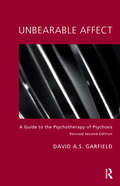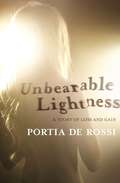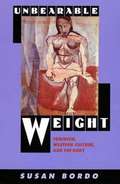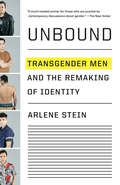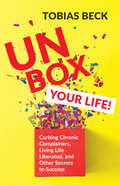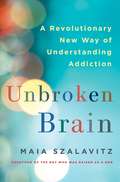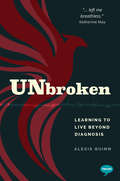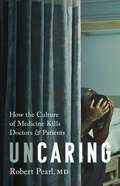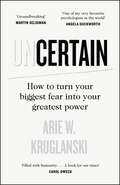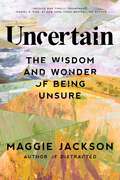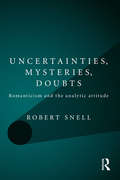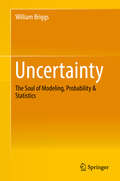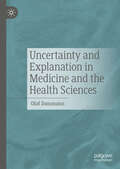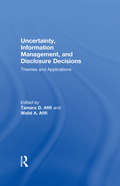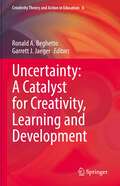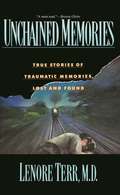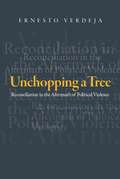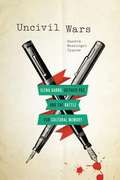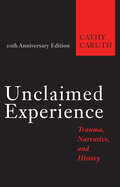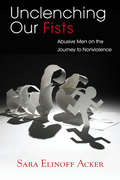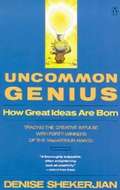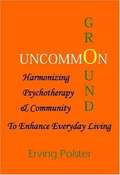- Table View
- List View
Unbearable Affect: A Guide to the Psychotherapy of Psychosis (General And Clinical Psychiatry Ser.)
by David GarfieldIn this cohesive, dramatic, and highly readable book, the author establishes a roadmap for the diagnosis and psychotherapeutic treatment of psychotic disorders based on finding, understanding and reordering of unbearable affect. He provides concrete clinical advice, vivid examples, and crisp jargon-free descriptions of theoretical concepts and clinical techniques. Most of all, he demonstrates that it is possible for psychotic patients to take control of their conditions, rebuild family relationships, and establish themselves in the viable productive lives that they have long despaired of achieving.
Unbearable Lightness: A Story of Loss and Gain
by Portia De RossiI didn't decide to become anorexic. It snuck up on me disguised as a healthy diet, a professional attitude. Being as thin as possible was a way to make the job of being an actress easier . . . Portia de Rossi weighed only 82 pounds when she collapsed on the set of the Hollywood film in which she was playing her first leading role. This should have been the culmination of all her years of hard work first as a child model in Australia, then as a cast member of one of the hottest shows on American television. On the outside she was thin and blond, glamorous and successful. On the inside, she was literally dying. In this searing, unflinchingly honest book, Portia de Rossi captures the complex emotional truth of what it is like when food, weight, and body image take priority over every other human impulse or action. She recounts the elaborate rituals around eating that came to dominate hours of every day, from keeping her daily calorie intake below 300 to eating precisely measured amounts of food out of specific bowls and only with certain utensils. When this wasn't enough, she resorted to purging and compulsive physical exercise, driving her body and spirit to the breaking point. Even as she rose to fame as a cast member of the hit television shows Ally McBeal and Arrested Development, Portia alternately starved herself and binged, all the while terrified that the truth of her sexuality would be exposed in the tabloids. She reveals the heartache and fear that accompany a life lived in the closet, a sense of isolation that was only magnified by her unrelenting desire to be ever thinner. With the storytelling skills of a great novelist and the eye for detail of a poet, Portia makes transparent as never before the behaviors and emotions of someone living with an eating disorder. From her lowest point, Portia began the painful climb back to a life of health and honesty, falling in love with and eventually marrying Ellen DeGeneres, and emerging as an outspoken and articulate advocate for gay rights and women's health issues. In this remarkable and beautifully written work, Portia shines a bright light on a dark subject. A crucial book for all those who might sometimes feel at war with themselves or their bodies, Unbearable Lightness is a story that inspires hope and nourishes the spirit.
Unbearable Weight: Feminism, Western Culture, and the Body
by Susan BordoFantastic study of women and their bodies. This 10th anniversary edition has a new preface by the author plus a foreword by Leslie Haywood, feminist scholar superstar, an authority on women athletes and body builders. When originally published in 1993, it made the list of NYT Notable Books of the Year.
Unbound: Transgender Men and the Remaking of Identity
by Arlene SteinAn intimate portrait of a new generation of transmasculine individuals as they undergo gender transitions Award-winning sociologist Arlene Stein takes us into the lives of four strangers who find themselves together in a sun-drenched surgeon’s office, having traveled to Florida from across the United States in order to masculinize their chests. <P><P>Ben, Lucas, Parker, and Nadia wish to feel more comfortable in their bodies; three of them are also taking testosterone so that others recognize them as male. <P>Following them over the course of a year, Stein shows how members of this young transgender generation, along with other gender dissidents, are refashioning their identities and challenging others’ conceptions of who they are. <P>During a time of conservative resurgence, they do so despite great personal costs. <P>Transgender men comprise a large, growing proportion of the trans population, yet they remain largely invisible. In this powerful, timely, and eye-opening account, Stein draws from dozens of interviews with transgender people and their friends and families, as well as with activists and medical and psychological experts. <P>Unbound documents the varied ways younger trans men see themselves and how they are changing our understanding of what it means to be male and female in America.
Unbox Your Life!: Curbing Chronic Complainers, Living Life Liberated, and Other Secrets to Success
by Tobias Beck“Unbox Your Life will take you on an exciting journey of self-discovery and to a fulfilling life of meaning and purpose.” —Sean Covey, president of FranklinCovey Education and New York Times bestselling author of The 4 Disciplines of ExecutionIn this international bestseller, Tobias Beck shows you how to successfully steer your own life instead of having it determined by others.Keep killjoys, energy vampires, and chronic complainers out of your life with Tobias Beck’s Liberated® philosophy. Polarizing, provocative, and unconventional, Unbox Your Life urges readers to liberate themselves from a negative attitude, navigate a highly sensitive personality, and finally live successfully and authentically.Unbox Your Life follows Beck’s own inspiring story about success and what it really means. Pairing fifteen years of experience in personality development and behavioral psychology with stories that are as entertaining as they are instructive, Unbox Your Life provides:Self-motivation tips to help you forge your own path and be guided by your dreamsAdvice to seek out people who support you, let you grow, and move forwardFunny comics that illustrate proven-to-work strategies
Unbroken Brain: A Revolutionary New Way of Understanding Addiction
by Maia SzalavitzChallenging both the idea of the addict's 'broken brain' and the notion of a simple 'addictive personality,' this book offers a radical and groundbreaking new perspective, arguing that addictions are learning disorders and shows how seeing the condition this way can untangle our current debates over treatment, prevention, and policy.
Unbroken: Learning to Live Beyond Diagnosis (Inspirational Series)
by Alexis QuinnAlexis Quinn has always known she was different. Academically and athletically gifted, she soared through her years in education, but failed to socialise adequately with her peers. Somehow, social norms just passed her by. But her difference had always been her strength, until the birth of her child, and the death of her brother, Josh; then her difference became her downfall. Unable to deal with the reality of what happened with Josh, Alexis was detained under the mental health act against her will. She found herself struggling for years, with diagnosis after diagnosis landing on her shoulders. Told repeatedly by doctors that she was dangerous, Alexis tried to become the person the system wanted her to be: someone normal. But it seemed that normal was always just out of reach.As time went by, she realised that the care she thought was going to help her, might just be the very thing that would destroy her.
Uncaring: How the Culture of Medicine Kills Doctors and Patients
by Robert PearlDoctors are taught how to cure people. But they don&’t always know how to care for them.Hardly anyone is happy with American healthcare these days. Patients are getting sicker and going bankrupt from medical bills. Doctors are burning out and making dangerous mistakes. Both parties blame our nation&’s outdated and dysfunctional healthcare system. But that&’s only part of the problem.In this important and timely book, Dr. Robert Pearl shines a light on the unseen and often toxic culture of medicine. Today&’s physicians have a surprising disdain for technology, an unhealthy obsession with status, and an increasingly complicated relationship with their patients. All of this can be traced back to their earliest experiences in medical school, where doctors inherit a set of norms, beliefs, and expectations that shape almost every decision they make, with profound consequences for the rest of us.Uncaring draws an original and revealing portrait of what it&’s actually like to be a doctor. It illuminates the complex and intimidating world of medicine for readers, and in the end offers a clear plan to save American healthcare.
Uncertain: How to Turn Your Biggest Fear into Your Greatest Power
by Arie KruglanskiTO ACHIEVE THE EXTRAORDINARY, FIRST EMBRACE THE UNKNOWN . . .Discover the definitive guide to our fear of uncertainty, and how we can stop it from holding us back'Groundbreaking' MARTIN SELIGMAN'One of my very favorite psychologists in the world' ANGELA DUCKWORTH'This is the book we've been waiting for' CAROL DWECK, bestselling author of Mindset: The New Psychology of Success____________Do you fear uncertainty?Why is the unknown so paralysing?And how can we use doubt to our advantage?Our safe modern world has wired us to fear the unknown, rather than use it to our benefit. But what if there was a way of turning that uncertainty into our greatest strength? Imagine being able to make important decisions without anxiety. Imagine being the calm at the centre of every storm.In Uncertain, the world-renowned psychologist Professor Arie Kruglanski shows us that there's only one certain way to face the unknown, and that is to fundamentally change the way we perceive it.This definitive book will transform the way you think about the unknown. Suddenly, you'll stop fearing uncertainty and learn to not only face it, but also harness the power that comes with it.Don't let uncertainty rule your life.Instead, embrace it and achieve the extraordinary.____________'This groundbreaking book is the place to go to discover how to embrace uncertainty and turn it to your growth and benefit' Martin Seligman, author of The Hope Circuit'One of my very favorite psychologists in the world tackles a subject that is both timeless and timely [and] shows us that though uncertainty is inevitable, how we react to it is not' Angela Duckworth, bestselling author of Grit'This is the book we've been waiting for. With his tremendous spirit, wit, knowledge, and wisdom, Kruglanski give us a book that helps us understand and navigate the uncertain world we live in. It's both based on science and filled with humanity-with deep compassion and benevolent guidance. It is a book for our time' Carol Dweck, author of Mindset: The New Psychology of Success'If you're not sure if you need this book, then you do. Original, insightful, and thought-provoking, the world's expert on the psychology of uncertainty reveals what science can tell us about our lives on the razor's edge' Daniel Gilbert, the New York Times bestselling author of Stumbling on Happiness'If there's anything I'm certain about, is that you'll love this book' Ayelet Fishbach, author of Get It Done
Uncertain: The Wisdom and Wonder of Being Unsure
by Maggie JacksonA revolutionary guide to flourishing in times of flux and angst by harnessing the overlooked power of our uncertainty. <P><P>In an era of terrifying unpredictability, we race to address complex crises with quick, sure algorithms, bullet points, and tweets. How could we find the clarity and vision so urgently needed today by being unsure? Uncertain is about the triumph of doing just that. A scientific adventure tale set on the front lines of a volatile era, this epiphany of a book by award-winning author Maggie Jackson shows us how to skillfully confront the unexpected and the unknown, and how to harness not-knowing in the service of wisdom, invention, mutual understanding, and resilience. <P><P>Long neglected as a topic of study and widely treated as a shameful flaw, uncertainty is revealed to be a crucial gadfly of the mind, jolting us from the routine and the assumed into a space for exploring unseen meaning. Far from luring us into inertia, uncertainty is the mindset most needed in times of flux and a remarkable antidote to the narrow-mindedness of our day. <P><P>In laboratories, political campaigns, and on the frontiers of artificial intelligence, Jackson meets the pioneers decoding the surprising gifts of being unsure. Each chapter examines a mode of uncertainty-in-action, from creative reverie to the dissent that spurs team success. Step by step, the art and science of uncertainty reveal being unsure as a skill set for incisive thinking and day-to-day flourishing.
Uncertainties, Mysteries, Doubts: Romanticism and the analytic attitude
by Robert SnellWhat is it to listen? How do we hear? How do we allow meanings to emerge between each other? 'This book is about what Freud called "freely" or "evenly suspended attention", a form of listening, a kind of receptive incomprehension, which is fundamental and mandatory for the practice of psychoanalysis and psychotherapy. The author steps outside the usual parameters of psychoanalytic writing and explores how works of art and literature which elicit and require such listening began to appear in Europe, in abundance, from the late eighteenth-century onwards. Uncertainties, Mysteries, Doubts is a timely reminder, in the present era of audit and manualisation, of some of psychoanalysis's deep and living cultural roots. It hopes- by immersing the reader in the emotional, critical and contextual worlds of some artists and poets of Romanticism- to help psychotherapists, psychoanalysts, and counsellors in the endless challenge of staying open to their clients and patients, faced as we all are, therapists and clients alike, by multiple pressures to knowledgeable closure.
Uncertainty
by William BriggsThis book presents a philosophical approach to probability and probabilistic thinking, considering the underpinnings of probabilistic reasoning and modeling, which effectively underlie everything in data science. The ultimate goal is to call into question many standard tenets and lay the philosophical and probabilistic groundwork and infrastructure for statistical modeling. It is the first book devoted to the philosophy of data aimed at working scientists and calls for a new consideration in the practice of probability and statistics to eliminate what has been referred to as the "Cult of Statistical Significance. " The book explains the philosophy of these ideas and not the mathematics, though there are a handful of mathematical examples. The topics are logically laid out, starting with basic philosophy as related to probability, statistics, and science, and stepping through the key probabilistic ideas and concepts, and ending with statistical models. Its jargon-free approach asserts that standard methods, such as out-of-the-box regression, cannot help in discovering cause. This new way of looking at uncertainty ties together disparate fields -- probability, physics, biology, the "soft" sciences, computer science -- because each aims at discovering cause (of effects). It broadens the understanding beyond frequentist and Bayesian methods to propose a Third Way of modeling.
Uncertainty Quantification in Computational Fluid Dynamics and Aircraft Engines
by Francesco Montomoli Mauro Carnevale Antonio D'Ammaro Michela Massini Simone SalvadoriThis book introduces novel design techniques developed to increase the safety of aircraft engines. The authors demonstrate how the application of uncertainty methods can overcome problems in the accurate prediction of engine lift, caused by manufacturing error. This in turn ameliorates the difficulty of achieving required safety margins imposed by limits in current design and manufacturing methods. This text shows that even state-of-the-art computational fluid dynamics (CFD) are not able to predict the same performance measured in experiments; CFD methods assume idealised geometries but ideal geometries do not exist, cannot be manufactured and their performance differs from real-world ones. By applying geometrical variations of a few microns, the agreement with experiments improves dramatically, but unfortunately the manufacturing errors in engines or in experiments are unknown. In order to overcome this limitation, uncertainty quantification considers the probability density functions of manufacturing errors. It is then possible to predict the overall variation of the jet engine performance using stochastic techniques. Uncertainty Quantification in Computational Fluid Dynamics and Aircraft Engines demonstrates that some geometries are not affected by manufacturing errors, meaning that it is possible to design safer engines. Instead of trying to improve the manufacturing accuracy, uncertainty quantification when applied to CFD is able to indicate an improved design direction. This book will be of interest to gas turbine manufacturers and designers as well as CFD practitioners, specialists and researchers. Graduate and final year undergraduate students may also find it of use.
Uncertainty and Explanation in Medicine and the Health Sciences
by Olaf DammannThis book offers a comprehensive account of how uncertainty is tackled in medicine and the health sciences. Olaf Dammann explores recent accounts of medicine as ineffective and suggests that the impression that medicine does not achieve its goal is, at least in part, due to the aleatoric (natural) uncertainty of biomedical processes and the subsequent epistemic (cognitive) uncertainty of those who desire solid information about such processes. Dammann shows how concepts like inference, explanation, and causometry help mitigate this disconnect. He points toward the possibility that some of the statistically rigid and formalized approaches (such as the randomized controlled trial as the gold standard for the justification of medical interventions) might better be replaced by approaches that emphasize the coherence of evidence and the people’s needs for helpful health interventions (auxiliarianism).
Uncertainty, Information Management, and Disclosure Decisions: Theories and Applications
by Walid Afifi Tamara AfifiThis volume integrates scholarly work on disclosure and uncertainty with the most up-to-date, cutting edge research, theories, and applications. Uncertainty is an ever-present part of human relationships, and the ways in which people reduce and/or manage uncertainty involves regulating their communication with others through revealing and concealing information. This collection is devoted to collating knowledge in these areas, advancing theory and presenting work that is socially meaningful. This work includes contributions from renowned scholars in interpersonal uncertainty and information regulation, focusing on processes that bridge boundaries within and across disciplines, while maintaining emphasis on interpersonal contexts. Disciplines represented here include interpersonal, family, and health communication, as well as relational and social psychology. Key features of the volume include: comprehensive coverage integrating the latest research on disclosure, information seeking, and uncertainty, a highly theoretical content, socially meaningful in nature (applied to real-world contexts), an interdisciplinary approach that crosses sub-fields within communication. This volume is a unique and timely resource for advanced study in interpersonal, health, or family communication. With its emphasis on theory, the book is an excellent resource for graduate courses addressing theory and/or theory construction, and it will also appeal to scholars interested in applied research.
Uncertainty: A Catalyst for Creativity, Learning and Development (Creativity Theory and Action in Education #6)
by Ronald A. Beghetto Garrett J. JaegerThis edited volume brings together a group of international researchers and theorists from various intellectual and analytic traditions to explore the role uncertainty plays in creativity, learning, and development. Contributors to this volume draw on existing programs of research as well as introduce new and even speculative directions for research, theory and practice.Learning and life are filled with uncertainty. Although the experience of uncertainty can cause emotional discomfort or cognitive rigidity, uncertainty serves as a catalyst and condition for change. In this way, uncertainty represents a core facet in the interrelationship among creativity, learning, and development. Considerations for both the benefits and potential costs of uncertainty will be addressed in this volume with an aim of understanding how uncertainty can be better understood in light of creativity, learning, and development. Taken together this volume stands to contribute to our collective understanding of the role that uncertainty plays in learning and life and highlights how conceptualizing and studying uncertainty in new ways can promote positive and lasting change.
Unchained Memories: True Stories of Traumatic Memories, Lost and Found
by Lenore TerrCan a long-forgotten memory of a horrible event suddenly resurface years later? How can we know whether a memory is true or false? Seven spellbinding cases shed light on why it is rare for a reclaimed memory to be wholly false. Here are unforgettable true stories of what happens when people remember what they’ve tried to forget-plus one case of genuine false memory. In the best detective-story fashion, using her insights as a psychiatrist and the latest research on the mind and the brain, Lenore Terr helps us separate truth from fiction.
Unchopping a Tree: Reconciliation in the Aftermath of Political Violence
by Ernesto VerdejaPolitical violence does not end with the last death. A common feature of mass murder has been the attempt at destroying any memory of victims, with the aim of eliminating them from history. Perpetrators seek not only to eliminate a perceived threat, but also to eradicate any possibility of alternate, competing social and national histories. In his timely and important book, Unchopping a Tree, Ernesto Verdeja develops a critical justification for why transitional justice works. He asks, “What is the balance between punishment and forgiveness? And, “What are the stakes in reconciling?” Employing a normative theory of reconciliation that differs from prevailing approaches, Verdeja outlines a concept that emphasizes the importance of shared notions of moral respect and tolerance among adversaries in transitional societies. Drawing heavily from cases such as reconciliation efforts in Latin America and Africa-and interviews with people involved in such efforts-Verdeja debates how best to envision reconciliation while remaining realistic about the very significant practical obstacles such efforts face Unchopping a Tree addresses the core concept of respect across four different social levels-political, institutional, civil society, and interpersonal-to explain the promise and challenges to securing reconciliation and broader social regeneration.
Uncivil Wars: Elena Garro, Octavio Paz, and the Battle for Cultural Memory
by Sandra Messinger CypessThe first English-language book to place the works of Elena Garro (1916–1998) and Octavio Paz (1914–1998) in dialogue with each other, Uncivil Wars evokes the lives of two celebrated literary figures who wrote about many of the same experiences and contributed to the formation of Mexican national identity but were judged quite differently, primarily because of gender. While Paz’s privileged, prize-winning legacy has endured worldwide, Garro’s literary gifts garnered no international prizes and received less attention in Latin American literary circles. Restoring a dual perspective on these two dynamic writers and their world, Uncivil Wars chronicles a collective memory of wars that shaped Mexico, and in turn shaped Garro and Paz, from the Conquest period to the Mexican Revolution; the Spanish Civil War, which the couple witnessed while traveling abroad; and the student massacre at Tlatelolco Plaza in 1968, which brought about social and political changes and further tensions in the battle of the sexes. The cultural contexts of machismo and ethnicity provide an equally rich ground for Sandra Cypess’s exploration of the tandem between the writers’ personal lives and their literary production. Uncivil Wars illuminates the complexities of Mexican society as seen through a tense marriage of two talented, often oppositional writers. The result is an alternative interpretation of the myths and realities that have shaped Mexican identity, and its literary soul, well into the twenty-first century.
Unclaimed Experience: Trauma, Narrative, and History
by Cathy CaruthThe pathbreaking work that founded the field of trauma studies.In Unclaimed Experience, Cathy Caruth proposes that in the widespread and bewildering experience of trauma in our century—both in its occurrence and in our attempt to understand it—we can recognize the possibility of a history no longer based on simple models of straightforward experience and reference. Through the notion of trauma, she contends, we come to a new understanding that permits history to arise where immediate understanding may not. Caruth explores the ways in which the texts of psychoanalysis, literature, and literary theory both speak about and speak through the profound story of traumatic experience. Rather than straightforwardly describing actual case studies of trauma survivors, or attempting to elucidate directly the psychiatry of trauma, she examines the complex ways that knowing and not knowing are entangled in the language of trauma and in the stories associated with it. Caruth’s wide-ranging discussion touches on Freud’s theory of trauma as outlined in Moses and Monotheism and Beyond the Pleasure Principle. She traces the notion of reference and the figure of the falling body in de Man, Kleist, and Kant; the narratives of personal catastrophe in Hiroshima mon amour; and the traumatic address in Lecompte’s reinterpretation of Freud’s narrative of the dream of the burning child. In this twentieth-anniversary edition of her now classic text, a substantial new afterword addresses major questions and controversies surrounding trauma theory that have arisen over the past two decades. Caruth offers innovative insights into the inherent connection between individual and collective trauma, on the importance of the political and ethical dimensions of the theory of trauma, and on the crucial place of literature in the theoretical articulation of the very concept of trauma. Her afterword serves as a decisive intervention in the ongoing discussions in and about the field.
Uncle Vampire
by Cynthia D. GrantEveryone knows vampires don't really exist--so why are Carolyn and her sister haunted by the same nocturnal visits? Twin sisters Honey and Carolyn have a secret: Uncle Toddy must be a vampire. Their parents won't acknowledge that Toddy's presence in their house is causing problems, but Carolyn can feel him sucking the life out of the family. Honey doesn't want to talk about it. She's a popular, pretty cheerleader with the perfect high school life. Why can't Carolyn just let it go and concentrate on good things, instead of asking questions about what happens when vampires knock at the door in the middle of the night? Both girls' grades are suffering under the strain of keeping their secret, threatening their school activities and plans for the future. Carolyn feels like she's going crazy, seeing things that no one else can. How can she convince Honey that she's only trying to stop the vampire from killing them both? Her only option is to force Uncle Toddy into the one place he doesn't want to be: the light.
Unclenching Our Fists: Abusive Men on the Journey to Nonviolence
by Sara Elinoff AckerThis book features eleven first-person stories of men from diverse class and racial backgrounds who have made a long-term commitment to end their physical and emotional abuse and controlling behaviors. These men speak frankly about the abuse they inflicted on their families, what it took to get them to face themselves, and how they feel about the damage they have caused. All participated in violence intervention programs, some for as long as ten years. To put a face on violence and to encourage activism for reform, most of the eleven have allowed their photos and real names to be used in the book. Surrounding this material are chapters that provide context about the disputes among researchers about whether batterer intervention programs work (only a small number of batterers renounce their abuse) and chapters that address the reactions of partners to these stories. "When the Man You Love is Abusive" is designed to caution women not to be manipulated by accounts of change and to outline the stages men need to pass through in the long process of becoming accountable. "The Last Word: Voices of Survivors" ends the book with a focus group discussion in which former abuse victims and advocates respond candidly to the men's stories.
Unclenching Our Fists: Abusive Men on the Journey to Nonviolence
by Sara Elinoff AckerThis book features eleven first-person stories of men from diverse class and racial backgrounds who have made a long-term commitment to end their physical and emotional abuse and controlling behaviors. These men speak frankly about the abuse they inflicted on their families, what it took to get them to face themselves, and how they feel about the damage they have caused. All participated in violence intervention programs, some for as long as ten years. To put a face on violence and to encourage activism for reform, most of the eleven have allowed their photos and real names to be used in the book. Surrounding this material are chapters that provide context about the disputes among researchers about whether batterer intervention programs work (only a small number of batterers renounce their abuse) and chapters that address the reactions of partners to these stories. "When the Man You Love is Abusive" is designed to caution women not to be manipulated by accounts of change and to outline the stages men need to pass through in the long process of becoming accountable. "The Last Word: Voices of Survivors" ends the book with a focus group discussion in which former abuse victims and advocates respond candidly to the men's stories.
Uncommon Genius: How Great Ideas Are Born
by Denise ShekerjianWhere do great ideas come from? 40 winners of the MacArthur Foundation Fellowship provide glimpses into their experiences of the creative process.
Uncommon Ground: Harmonizing Psychotherapy & Community To Enhance Everyday Living
by Erving PolsterUncommon Ground invites readers to consider the psychotherapy of the future, not just in broad philosophical ways, but in specific, application-oriented ways. Erving Polster, whose decades of distinguished contributions have made him a preeminent voice in the field, urges his colleagues to step out of the status quo to think creatively about how psychotherapy might be made more accessible to greater numbers of people over longer periods of time.
